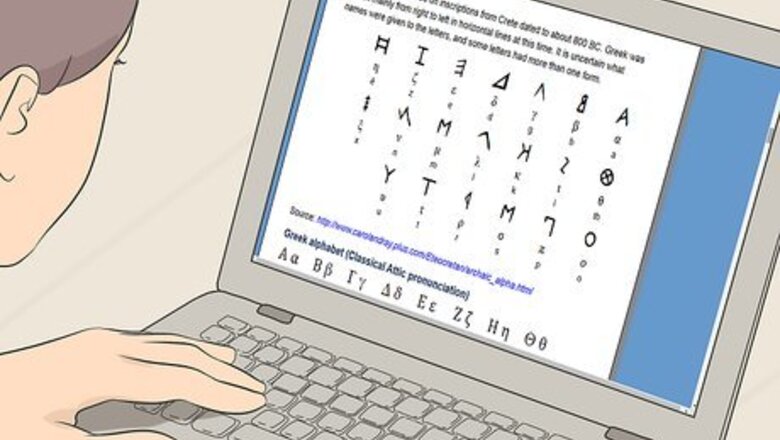
views
X
Research source
Alphabet and Pronunciation
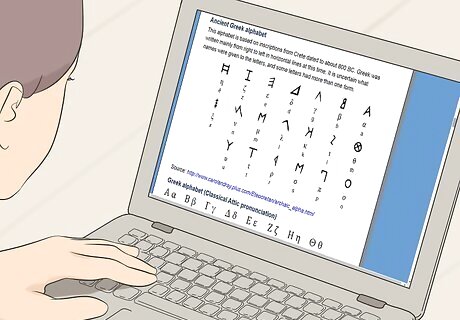
Download an alphabet chart and study it. The Greek alphabet differs from the Latin alphabet. If you want to learn ancient Greek, start by learning the alphabet, just as the alphabet was likely one of the first things you learned in your native language. Free Greek alphabet charts are available from many websites and organizations, such as the one available for download at https://www.omniglot.com/writing/greek.htm. In addition to learning how to recognize the letters, you'll also want to practice writing them. The Open University has free ancient Greek alphabet quizzes that you can use to test your knowledge of the alphabet. To use them, go to http://www.open.ac.uk/Arts/greek/# and click on "Letters."Tip: If you want to start writing Greek letters, study handwritten Greek rather than trying to mimic a typeface, which can be challenging. Handwritten Greek is much simpler.
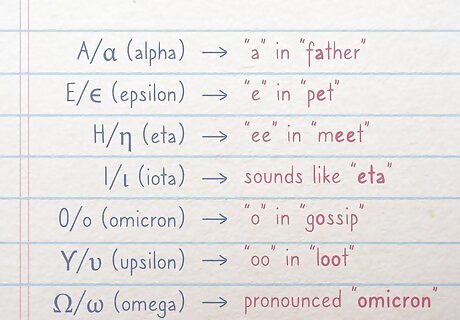
Start by pronouncing the 5 vowel sounds. There are 7 vowels in Greek, but there are only 5 distinct vowel sounds. Eta, iota, and upsilon all make the same sound. Similarly, omicron and omega both make the same sound. There is no phonetic distinction between short and long vowels — a long vowel is simply said longer. The 5 vowel sounds in ancient Greek are as follows: A/α (alpha): Makes an "ah" sound, as the "a" in the English word "father." E/ϵ (epsilon): Makes an "eh" sound, as the "e" in the English word "pet." H/η (eta): Makes an "ee" sound, as the "ee" in the English word "meet." I/ι (iota): Sounds exactly like eta. O/o (omicron): Makes an "ah" sound, as the "o" in the English word "gossip." However, your mouth is more rounded than it would be when making the alpha sound. ϒ/υ (upsilon): By itself, sounds exactly like eta and iota. In combination with an omicron, makes an "oo" sound as in the English word "loot." Ω/ω (omega): Pronounced the same as omicron.Tip: The 5 vowel sounds in ancient Greek are closest to the 5 vowel sounds in Italian, Spanish, or Japanese.
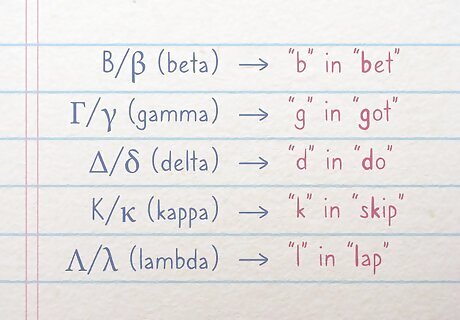
Try the first 5 consonants that make familiar sounds. The Latin alphabet used for English and other European languages is derived from the Greek alphabet, and many of the Greek consonants make sounds similar to the corresponding letter in the Latin alphabet. B/β (beta): Sounds like the "b" in the English word "bet." Note that this is different from modern Greek, in which beta sounds like the "v" in the English word "vet." Γ/γ (gamma): Sounds like the "g" in the English word "got." This ancient pronunciation also differs from the modern Greek pronunciation. Δ/δ (delta): Sounds like the "d" in the English word "do." In modern Greek, delta sounds like the "th" in the English word "this." K/κ (kappa): Sounds like the "k" in the English word "skip." Unlike English, kappa is never aspirated (said with an audible breath). Λ/λ (lambda): Sounds like the "l" in the English word "lap."

Move on to the next 5 consonants that sound like their English counterparts. Once you've got the first 5 consonants down, which shouldn't take extensive practice, move on to the next 5 consonants with familiar sounds. While the letters don't necessarily look like their counterparts in the Latin alphabet, the sounds are similar. M/μ (mu): Sounds like the "m" in the English word "map." N/ν (nu): Sounds like the "n" in the English word "new." However, the name of the letter is pronounced "nee," not "new" or "noo," as you may hear it pronounced in English. Π/π (pi): Sounds like the "p" in the English word "spot." Note that pi is never aspirated as it is in English. Σ/σ (sigma): Sounds like the "s" in the English word "soup." T/τ (tau): Sounds like the "t" in the English word "stop." As with pi, tau is never aspirated as it is in English.
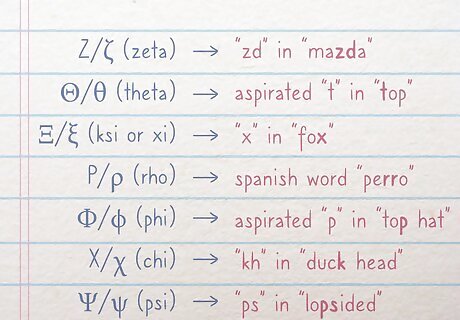
Practice the consonants that make sounds that don't exist in English. Some Greek letters make a sound not made by a single letter in the Latin alphabet. For a few of these consonants, the sound they make doesn't exist in English at all but can be compared to sounds in other languages. Z/ζ (zeta): In ancient Greek, zeta sounds like the "zd" in the name "Mazda." In modern Greek, zeta sounds like the "z" in the English word "zone." Θ/θ (theta): In ancient Greek, a more aspirated version of the "t" sound in the English word "top." Think of making a "t" sound followed immediately by a separate hard "h" sound, as in the English phrase "hot head." Ξ/ξ (ksi or xi): Sounds like the "x" in the English word "fox." The letter does not make a different sound, regardless of where it occurs in the word. P/ρ (rho): A tap rather than a trill, as in the Spanish word "pero." May also have been trilled, as in the Spanish word "perro." However, in Greek, unlike in Spanish, it makes no difference, in terms of the definition of the word, whether you trill the rho or not. Φ/ϕ (phi): Pronounce an aspirated "p" similar to the "ph" in the English phrase "top hat." X/χ (chi): In ancient Greek, an aspirated "k" sound, similar to the "kh" sound in the English phrase "duck head." In modern Greek, chi sounds similar to the German or Scottish "ch," or the Spanish "j" sound. Ψ/ψ (psi): Sounds similar to the "ps" in the English word "lopsided."
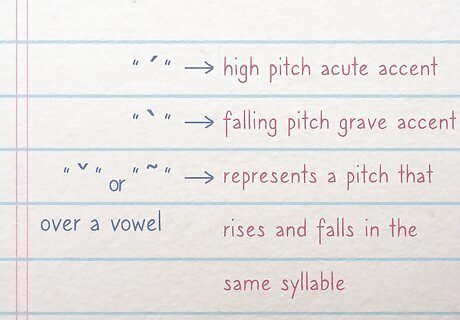
Use pitch to differentiate syllables. In English and European languages, syllables are stressed to differentiate them from one another, meaning that one syllable is pronounced slightly more loudly than the others. Ancient Greek uses changes in pitch to differentiate syllables, similar to tonal languages, such as Chinese. There are 3 basic tones or pitches in Ancient Greek, referred to as accents: An acute accent is a high pitch, represented with a " ´ " over the vowel. A grave accent is a falling pitch, represented with a " ` " over the vowel. If you see a " ˇ " or " ˜ " over a vowel, this represents a pitch that rises and falls in the same syllable. This accent only occurs over a long vowel, because you need the time to alter the pitch.
Greek Grammar
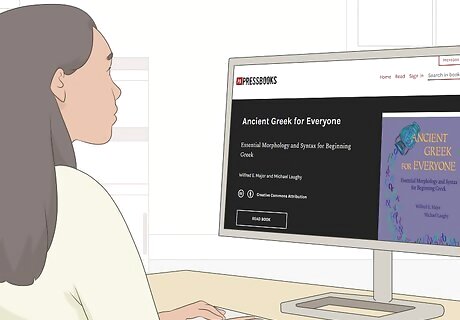
Take an online course to get the basics down. The Linguistic Research Center and the University of Texas at Austin has created a 10-lesson basic course that covers the Greek alphabet and basic Greek grammar. While these courses won't necessarily get you to the point where you can read ancient texts with ease, they will give you a solid foundation that you can use to advance your study. Two classics professors also offer "Ancient Greek for Everyone" at https://ancientgreek.pressbooks.com/front-matter/introduction/. This is a self-guided course that takes you from the alphabet and pronunciation all the way through grammar basics.
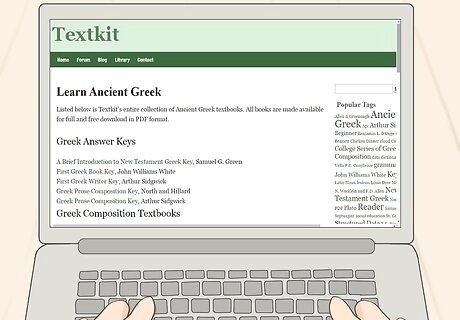
Download ancient Greek textbooks to structure your study. If you're studying ancient Greek on your own, a textbook will help you organize your study and progress thematically. The website Textkit has converted public domain textbooks and dictionaries to PDF and made them available for free download at https://www.textkit.com/greek_grammar.php. The textbooks also have answer keys, which are essential if you are studying on your own. John William White's "First Greek Book" is a classic ancient Greek textbook available for download for free on Textkit. To supplement the book, you can use the online tutorial available at https://daedalus.umkc.edu/FirstGreekBook/.
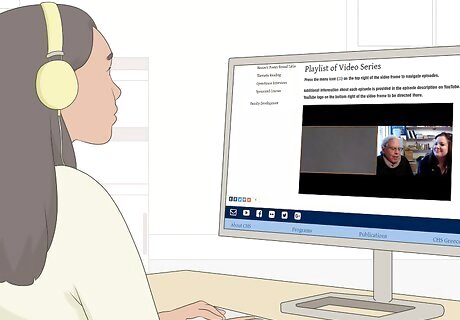
Watch videos on ancient Greek. The Center for Hellenic Studies at Harvard University has a video series with 64 videos that provide an introduction to ancient Greek. The entire series is the equivalent of two semesters of a college-level introductory course. To access the videos, go watch them directly on YouTube, which may be helpful if you want to watch them from the YouTube app on a mobile device. These videos follow a specific textbook, portions of which are available for free on Google Scholar. You can also order the book online. However, the videos are still helpful even if you're using a different textbook.Tip: Since ancient Greek is mostly read rather than spoken, videos don't particularly have an advantage over books and other study materials. However, if you are an auditory learner, it may help you to hear the concepts spoken.
Free Online Resources
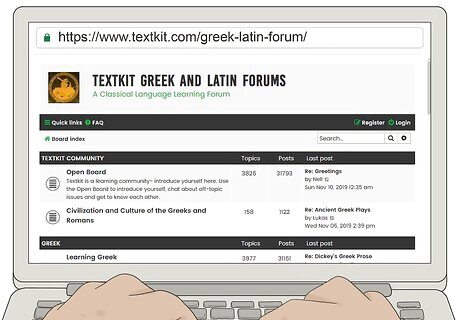
Participate in an online forum. It's not all that common to find people conversing in ancient Greek. However, the website Textkit has ancient Greek forums at https://www.textkit.com/greek-latin-forum/ where you can chat with people who are learning ancient Greek as well as those who have mastered the language. In addition to a board on learning Greek, the website also hosts a board that discusses Homeric Greek and early Greek poetry, as well as a separate board for New Testament Greek (which differs in some respects from ancient Greek).Warning: Mind your personal privacy in online forums, even those dedicated to ancient Greek. Avoid giving out too much personal information to people you haven't gotten to know very well and never give out personal information or contact information in a public forum.

Download worksheets and handouts for practice. Many university classics departments offer free worksheets and handouts related to specific aspects of ancient Greek. View these online and download or print the ones you think would be the most helpful for you. Some pages you might find useful include: Nifty Greek Handouts from the Department of Classics at The University of Chicago: https://classics.uchicago.edu/faculty/dik/niftygreek Greek Grammar Review from Classical Studies at Cornell College: https://www.cornellcollege.edu/classical_studies/reviewgreek/greekgrammar.shtml
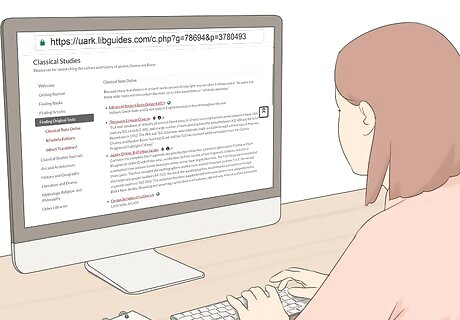
Access free copies of classic Greek literature. Ancient Greek texts are public domain works, and even some of the oldest translations are no longer subject to copyright protection. This means you can find copies of most famous classic literary works online for free. The University of Arkansas has a collection of links to classical texts online at https://uark.libguides.com/c.php?g=78694&p=3780493. Tufts University also has a collection of digitized primary sources in ancient Greek at http://www.perseus.tufts.edu/hopper/collections. Textkit has some classic reading texts available in digital format at https://www.textkit.com/greek_grammar.php, including Homer's The Iliad and The Odyssey.














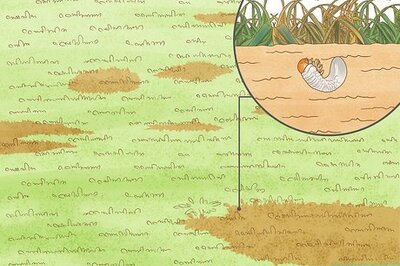




Comments
0 comment